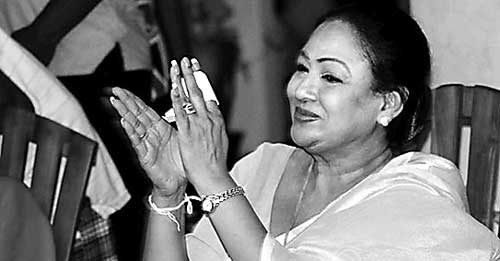Sunday Feb 15, 2026
Sunday Feb 15, 2026
Saturday, 13 May 2017 00:21 - - {{hitsCtrl.values.hits}}
By S.S. Selvanayagam
The Supreme Court yesterday (12) issued an Interim Order staying till Monday (15) the operation of the Court of Appeal order disqualifying Galle District UPFA Parliamentarian Geetha Kumarasinghe as a Member of Parliament.
The bench comprising Justices B.P.  Aluvihara, Priyantha Jayawardane and Anil Gooneratne fixed for support on Monday (15) her appeal against the Court of Appeal judgment on her dual citizenship.
Aluvihara, Priyantha Jayawardane and Anil Gooneratne fixed for support on Monday (15) her appeal against the Court of Appeal judgment on her dual citizenship.
Kumarasinghe last Tuesday (9) filed an appeal in the Supreme Court against the judgment of the Court of Appeal repealing her seat in Parliament over her dual citizenship.
J.C. Welamuna, appearing for petitioner-respondents W.W.E. Buweneka, J.K. Amarawardhana, A.C.Gunasekera, J.K.Wijesinghe and Prasanna Deepthilal yesterday opposed the appeal being supported, claiming that they had not received notice and papers.
Romesh de Silva PC with Sugath Caldera appeared for the respondent-appellant Geetha Kumarasinghe. Santhaka Jayasundera appeared for respondent-respondent UPFA Secretary Prof. Vishwa Warnapala. Deputy Solicitor General Janak de Silva appeared for respondent-respondents the Controller of Immigration and Emigration, the Secretary General of Parliament and the Attorney General.
The Court of Appeal on 5 May ruled that she was not entitled to be a Member of Parliament as she had contested the election while being a dual citizen.
Justice Preethi Padman Surasena, with Justice Vijith Malalgoda (CA President ) agreeing, also directed the State to recover the cost from her as the debt to the State for the each day she sat in Parliament knowing that she was a dual citizen and disqualified from being a Member of Parliament.
The Attorney General informed the Court of Appeal that Kumarasinghe MP was still a citizen of Switzerland and according to the 19th Amendment to the Constitution a person who has dual citizenship cannot be a Member of Parliament.
Deputy Solicitor General Janak De Silva had also informed the Court of Appeal that, according to clause 91(1) of the Constitution, she was not entitled to parliamentary privileges and could not be a Member of Parliament.
The Appeal Court ruled that Kumarasinghe could no longer function as a Parliamentarian as she had contested the general election while possessing dual citizenship.
A former actress-turned politician Kumarasinghe holds dual citizenship in Sri Lanka and Switzerland.
Under the Constitution of Sri Lanka, no person can be elected to Parliament if they hold dual citizenship. Five voters of the Galle district had filed the writ petition in the Court of Appeal requesting court to declare Kumarasinghe ineligible to remain a Parliamentarian while holding dual citizenship.
The Court held that under the 19th Amendment to the Constitution, a dual citizen was not eligible to contest for parliamentary membership and therefore Kumarasinghe could no longer function as a parliamentarian. The petitioners in their writ application challenged her appointment and election as a parliamentarian based on her dual citizenship. The petitioners sought the Court of Appeal to issue a prerogative Writ Order requiring her to show by what authority she claims to hold office as a Member of Parliament and an another order declaring that she is disqualified from being a Member of Parliament and thus not entitled to hold office.